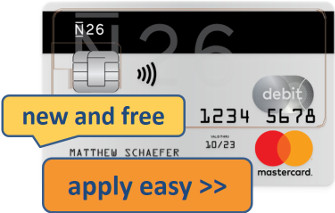Comparison of Tagesgeld (Call Money)
Further information about call money for curious readers
This comparison (calculation tool) of call money includes banks in Germany and in other European countries. Providers from other European countries offer the same safety, but often at a higher return!
Maybe you think, “that is impossible – a higher return is always accompanied by a higher risk”. Many of us have learned this in economics classes or in advanced courses.
Basically, that is correct! It applies to many investment types.
However, this is wrong for all listed call money investments here. Please forgive my distinct way of expression. 🙂
Here you will read of the politically created market manipulation, which you can take advantage of being a money saver!
1. Market manipulation called deposit guarantee
This market manipulation is called “deposit guarantee”. The elderly people among us still remember that there was no deposit guarantee. Here, of course, the following applied: the higher the rate, the higher the risk!
1.1 A short glance into history
The history of deposit insurance in Germany started in 1937 with a cooperative guarantee funds (cooperative banks). Only in 1966, the first private banks – based on voluntariness – followed with a nationwide security system.
After the scandal surrounding the bankruptcy of the Herstatt Bank in 1974, the deposit guarantee was extended, but still on a voluntary private-sector basis.
The legal rights and obligations started only in 1986, due to the EU-regulations that became transposed into national law. Over the following years, there have been a lot of changes, especially increases of the insured sum and accelerations of the payment process of compensation.
1.2 Deposit Guarantee Act
The latest amendments, and thus improvement for us savers, took place in 2015 through the introduction of the Deposit Guarantee Act (EinSiG in German). There, the legal right to compensation is determined in paragraph 5 and in paragraph 8 the insured sum of Euros 100,000.
This basic framework can be found in all member states of the European Union and thus at all banks listed in the call money-comparison!
Many German banks have an additional deposit guarantee, which covers deposits above the legally committed Euros 100,000. We will not go into detail, because who deposits more than Euros 100,000 (in joint accounts Euros 200,000) per bank in the form of call money has a “luxurious challenge”. 🙂
2. Let’s get back to the term manipulation:
2.1 A glance into recent history
In the medial financial crisis from 2007 to 2009, there were quite high interest rates on call money. During these months, the interest rates have increased like in a spiral to up to 6 per cent and showed especially the demand for money at banks.
Some banks went bankrupt during the financial crisis or were sold as an emergency. In Germany, the third-largest private bank, the Dresdner Bank, was sold to the second-largest bank, the Commerzbank, for an almost symbolic amount. A little later, the Commerzbank received aid from the state.
This did not matter to the call money investors. He/she got the bank statements with another bank logo from that point on. In 2010, the Noa Bank went bankrupt and all investors were 100% compensated up to Euros 50,000. At that time, the statutory insurance limit was only the half of today’s sum!
The investor did not have to do anything for the compensation. He/she received information post a few days after the bankrupt, in which one declared that he/she will get his/her deposit automatically reimbursed in a few days to the consigned bank account (reference account). Within a month, all customers were compensated.
Call money was good and secure in the crisis
Precaution has always been advised, if the respective national deposit funds – mostly in smaller states – was manageable. Therefore, at the bankruptcy of the Icelandic Kaupthing Bank (not part of the EU) there were major challenges and delays.
With regard to the volume of the national deposit guarantee fund, especially the consumer magazine Finanztest restrained the list of the top call money providers from abroad (as a consequence, many German investors missed high interest rates), because it reported concerns in the event of insolvency that investors could not be compensated.
2.2 Political forces are at work
One has to know the political will. Our highly developed banking and financial system is so fragile due to the immense amount of money with the many extreme credit levers and a huge debt ratio at banks and states, so that one undertakes any possible effort to retain confidence.
Therefore, the then Kaupthing investors, who otherwise would have lost almost everything, were compensated through negotiated emergency loans of the homelands. Even here in Germany and Europe, special institutions, such as SoFFin or ESM, were established. It is the main concern to always “produce” enough money, so that no one must go broke.
It is not about money, it is about trust!
These are the market manipulations! A functioning market would have purified itself. That works great for smaller and manageable markets.
However, today we have to deal with extremely puffed-up markets with such big participants that one does no longer want to allow this self-purifying function of a bankrupt out of fear of the chain reactions. Therefore, there are always further interventions (manipulations) in order to continue to maintain the existing system, with the intention to further develop it so that it will become better.
Do you know the expression, “too big to fail”? It expresses that a bank is too big to let it go bankrupt!
A new manipulation tool is the so-called banking union in the European Union.
Note: Call money is equally secure at any EU-bank; this was regulated!
3. Summary:
Call money (Tagesgeld) is an absolutely safe investment! Every bank in the above table
- has a 100% deposit guarantee up to Euros 100,000; many even secure more,
- is checked for integrity,
- is usable via online banking,
- provides account opening and communication with the provider in German language,
- and the account opening can be started directly through the provider!
The only risk you bear is the risk of return after deducting inflation. If the inflation rate is higher than the interest, you have indeed more money on the account, but you can buy less things with it.
Let’s be honest: through call money, no one has become rich. However, through secure saving (= not spending money) many people did! For this purpose call money is ideal. One deposits money safely to a separate account, which one would otherwise spend … or wouldn’t you?
General questions about the call money investment?
You are welcome to use the comments box for general questions about the call money and/or participate in the answers.
Please note that we are happy to provide data and information; however, these should not be misinterpreted as investment advice. We do not give advice! Everyone is responsible for his/her (financial) actions!
Further comparisons on this special portal:
- Comparison calculator for fixed deposit
- Instalment loans in comparison
- Instructions to DKB-Visa-Savings












Leave a Reply